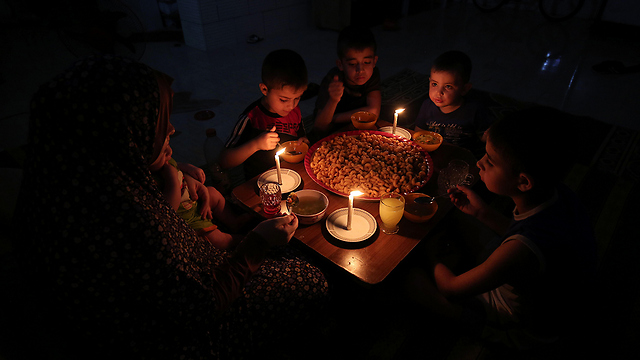
Gaza is definitely Israel’s problem
Op-ed: Despite the underground barrier and border fence, Gaza cannot be disconnected from Israel, and Israel cannot be disconnected from Gaza. It’s time to think outside the box. Now that Abbas is breaking off ties with the strip, we must start talking to Hamas—before another round of war leads to an unnecessary disaster.
Apart from Turkey, which occasionally sends some help, Gaza remains alone—with Hamas. The only lifeline is Iran, which announced last week it would resume its aid to the strip. The money hasn’t arrived yet, and when it does, it will be used by Hamas and its military wing, not by the general public.
Qatar, which kept Gaza’s head above the sewage water while turning the strip into a pawn in the game of alliances and boycotts in the “new Middle East,” is dealing with an Arab boycott for now, and the Gazans are the first to pay the price. Qatar’s ambassador to Gaza, Mohammed al-Emadi, left the strip several days ago. In a press conference before his departure, he said the Gazans were facing “dark days.”

As its residents are marking the holy month of Ramadan, Gaza is collapsing and losing hope. There is no short of goods in the markets, but there is no money to buy anything. Abbas has cut the salaries of 58,000 Palestinian Authority workers living in the strip by one-third. Even Hamas has cut its workers’ salaries. And in the month of Ramadan, food consumption is usually higher. The unemployment rate has reached 40 percent.
Many neighborhoods stink. There is a sewer overflow, and most of the wastewater goes directly into the sea, advancing northward, and is already approaching the desalination facility of our drinking water in Ashkelon. Very soon, it will reach Ashdod, and then possibly the shores of Tel Aviv too. Pollution doesn’t stop at the Erez Crossing.
In the past two weeks, even before Israel announced it was cutting down the power supply, Gazans had electricity only three hours a day. Without electricity, it’s impossible to purify and pump wastewater, it’s impossible to keep food in freezers, hospitals’ activity is being disrupted, agriculture is suffering, and the few workshops that were still active have been shut down. Without electricity, it’s impossible to pump the little potable water left in the wells, and the tap water in Gaza’s homes is muddy and undrinkable.
Miraculously, at the moment the anger isn’t directed at Israel but mainly at the Arab players: Abbas is seen as the main culprit, but the Gazans who are not affiliated with the Hamas camp are afraid to criticize him openly, so as not to make him hold back the little money he still pays. Saudi Arabia is being accused of adopting the policy that led to the boycott of Qatar, and Egypt is blamed for keeping up the blockade. After his visit to the Middle East, US President Donald Trump became an enemy too. And so even without a lot of love, Hamas is being pushed once again into Iran’s arms.
Israel and Egypt, going against their political and security interests, have given in to Abbas’ vengeful demand to cut the power supply to Gaza with unbearable lightness. This move won’t hurt Hamas; it will only hurt the population and increase its suffering. And let there be no illusions: The Gazans have neither the intention nor the energy to revolt and topple Hamas. They know Abbas won’t return to the strip, and neither will Israel, and definitely not Egypt. They have been left alone, without refuge, without hope.
Gaza won’t go away, and the ticking bomb’s fuse is getting shorter much faster than Israel can come up with a solution. Let’s make it clear: Gaza is definitely Israel’s problem. In spite of the underground barrier and overground border fence, Gaza cannot be disconnected from Israel, and Israel cannot be disconnected from Gaza. For the sake of the Israeli interest, it’s time to think outside the box. Now that Abbas is disconnecting the Palestinian Authority from Gaza, we must start talking to Hamas—indirectly, directly, through mediators or in any other way. Continuously burying our head in the sand is a strategic threat to Israel. And this should be done before another round of fighting that will lead to an unnecessary disaster, both for us and for the Gazans.
Dr. Ronni Shaked, Yedioth Ahronoth's former correspondent and commentator on Palestinian affairs, is a research fellow at the Harry S. Truman Research Institute for the Advancement of Peace at Hebrew University.










